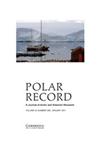The balance between critical thinking and paradigm thinking in the Arctic: Scientific cooperation across theoretical divides
IF 1.6
4区 环境科学与生态学
Q3 ECOLOGY
引用次数: 0
Abstract
Abstract Kuhnian’ paradigms are a commonly used method of explaining the structure of knowledge production within the social sciences; however, in some ways, they are also in opposition with Popperian’ critical thinking. The opposing approaches surmount to a comparative analytic method – Kuhn advocates undertaking science that is incommensurable, discipline-specific and ideologically and metaphysically fixed in nature; whilst Popper advocates science that is pluralistic, rebellious, interdisciplinary, and ideologically and metaphysically adaptable. This article utilises a systematic literature review of key peer-reviewed articles, book chapters and online articles from respected sources relating to Arctic scientific cooperation during and since the Cold War in order to provide a qualitative data source for comparative theoretical analysis. This article analyses key trends in Arctic environmental decision-making since the Cold War utilising a comparative critical constructivist framework based on epistemological challenges visible in the “Science Wars” between Thomas Kuhn and Karl Popper. By applying two of the foundations of social science (critical thinking and paradigms) to Arctic International Relations and Geopolitics, this article assesses the state of Arctic science cooperation and; the potential for Arctic science cooperation to solve wicked environmental problems. The article concludes that there are power relationships within the epistemological background to environmental decision-making which impacts science cooperation in the Arctic and; current trends in Arctic decision-making further propels the Arctic along a trajectory of environmental degradation.北极地区批判性思维和范式思维之间的平衡:跨越理论鸿沟的科学合作
摘要Kuhnian范式是社会科学中解释知识生产结构的常用方法;然而,在某些方面,他们也与波普尔的批判思想相悖。相反的方法超越了比较分析方法——库恩主张从事不可通约的、学科特定的、意识形态和形而上学固定在本质上的科学;波普尔提倡多元、反叛、跨学科、思想和形而上学相适应的科学。本文对冷战期间和冷战以来与北极科学合作有关的重要同行评审文章、书籍章节和在线文章进行了系统的文献综述,为比较理论分析提供了定性数据来源。本文基于托马斯·库恩和卡尔·波普尔之间的“科学战争”中可见的认识论挑战,利用比较批判性建构主义框架分析了冷战以来北极环境决策的主要趋势。本文将社会科学的两个基础(批判性思维和范式)应用于北极国际关系和地缘政治,评估了北极科学合作的现状;北极科学合作解决恶劣环境问题的潜力。文章认为,环境决策在认识论背景下存在着影响北极科学合作的权力关系;当前北极决策的趋势进一步推动北极沿着环境退化的轨道发展。
本文章由计算机程序翻译,如有差异,请以英文原文为准。
求助全文
约1分钟内获得全文
求助全文
来源期刊

Polar Record
环境科学-环境科学
CiteScore
1.40
自引率
25.00%
发文量
26
审稿时长
>36 weeks
期刊介绍:
Polar Record is an international, peer-reviewed scholarly periodical publishing results from a wide range of polar research areas. The journal covers original primary research papers in the humanities, social sciences, physical sciences, life sciences, and polar technology, as well as papers concerning current political, economic, legal, and environmental issues in the Arctic or Antarctic. Polar Record endeavours to provide rapid publication, normally within nine months of initial submission.
 求助内容:
求助内容: 应助结果提醒方式:
应助结果提醒方式:


